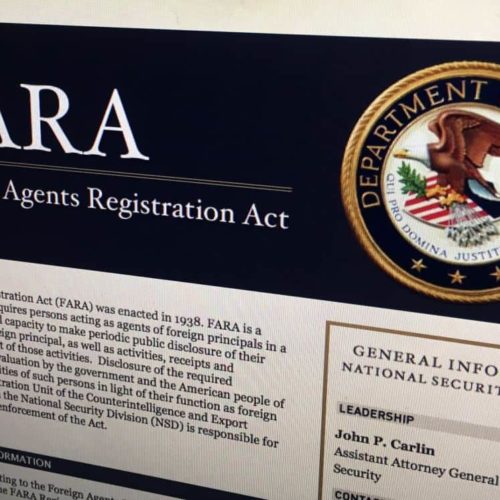Introduction
American leaders have been concerned about foreign influence since the country’s infancy. In his farewell address, President George Washington warned that passion for one’s political party “opens the door to foreign influence and corruption.”
Congress passed the Foreign Agents Registration Act in 1938 to address rising concern about Nazi propaganda in the years before World War II. When the arcane law applies, the United States has required foreign agents to comply with stringent disclosure requirements.
But penalties for violating FARA are exceedingly rare because, among other hurdles, the law says someone must have acted “willfully” in skirting its requirements.
Consider: Between 1966 and 2015, the Department of Justice brought only seven criminal FARA cases, and there were only three convictions. The Department of Justice has instead stressed efforts to encourage foreign agents’ voluntary compliance.
The Department of Justice agreed with 14 recommendations for improvement to enforcement and administration of FARA made in a 2016 audit by the Department of Justice’s Office of the Inspector General. But officials have long said they need more resources and new civil legal authority from Congress in order to properly administer and enforce FARA.
There are “huge gaps in what is being disclosed in general and certainly a lack of timely disclosures on a uniform basis” under the law, said Joshua Rosenstein, a lawyer with the firm Sandler Reiff Lamb Rosenstein & Birkenstock and an expert on the foreign agent statute. Even lawyers who specialize in the law say its requirements can be confusing.
FARA legislation pending in Congress would offer government officials more resources and authority. It would also end one of the most commonly used exemptions — registering under the less cumbersome Lobbying Disclosure Act — foreign agents use to avoid FARA.
But the bill’s prospects are uncertain. Members of Congress sponsoring the FARA reform bills did not respond to a request for comment. The White House declined to comment.
Last year, in what amounts to the highest-profile FARA prosecution in decades, Special Counsel Robert Mueller charged Trump’s former campaign manager, Paul Manafort, with FARA violations in connection with Manafort’s work in Ukraine. Manafort’s lawyer described the FARA charges as “a very novel theory.”
Most lobbyists would have previously put the odds of federal officials levying such charges as roughly akin to a significant April snowfall in Washington, D.C. — theoretically possible, but barely more than that.
That changed with Manafort’s indictment.
In client advisories, FARA lawyers — the ultimate noodges — have been warning of a more aggressive enforcement posture at the Department of Justice. And many of the private lawyers doing FARA work — a group small enough, a Covington & Burling advisory wryly notes, to “hold its meetings in the back of a mini-van” — say they are seeing more assertive questions from the Department of Justice. They’re also enjoying a business boomlet.
This month, Robert Kelner of Covington & Burling, a longtime FARA practitioner, wrote that the Department of Justice has begun telling recipients of department advisory opinions that it will “soon” publish copies of such advisory opinions publicly, something called for in the 2016 audit.
Those opinions lay out the department’s interpretation of FARA requirements, and are likely to lay out the agency’s answer to at least some questions about recurring FARA issues such as the use of exemptions.
Read more in Money and Democracy
Money and Democracy
The financial disclosures for Trump’s possible Supreme Court nominees
The Center for Public Integrity is tracking the disclosure forms for potential nominees to replace Justice Anthony Kennedy
Money and Democracy
Will Trump’s next Supreme Court pick be another millionaire?
With Associate Justice Anthony Kennedy retiring, the president says the search for a new pick will commence immediately.



Join the conversation
Show Comments